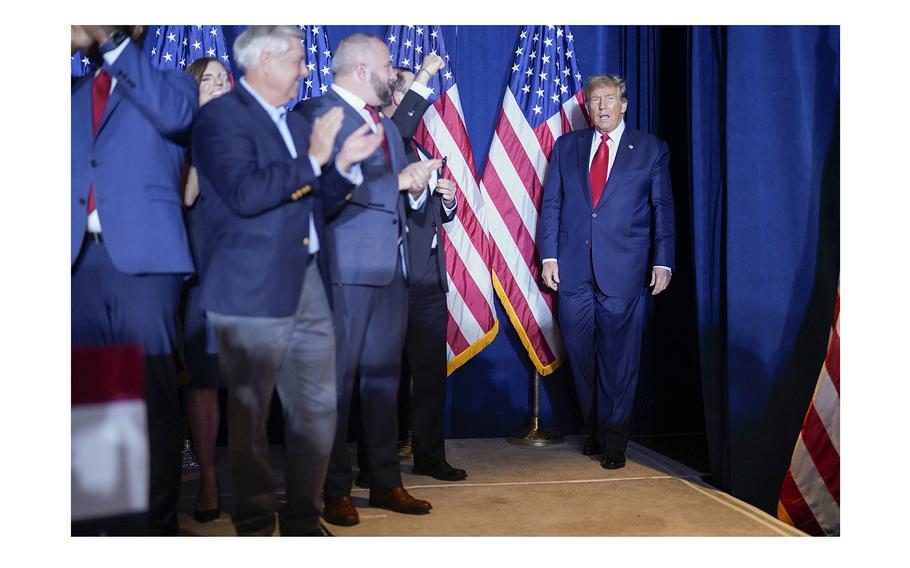
Former president Donald Trump takes the stage at a Republican primary watch party in Columbia, S.C., on Feb. 24, 2024. (Jabin Botsford/The Washington Post)
Donald Trump drew closer to the Republican presidential nomination on Saturday, winning Missouri’s contest and sweeping the Michigan GOP’s remaining delegates to the national party convention.
Michigan Republican officials and other preselected party members awarded Trump all 39 of the delegates up for grabs at their caucus convention in Grand Rapids. The former president also won most of the 16 delegates that were allotted based on Michigan’s statewide primary earlier in the week.
In Missouri and Idaho, Republican voters across the state also made their selection at party-run meetings Saturday. The Associated Press projected that Trump had won Missouri but has yet to call the race in Idaho.
Trump has won every state contest so far in a landslide and expects to clinch the nomination by mid-March. But Nikki Haley, the former U.N. ambassador urging her party to move on from the former president, has pledged to remain in the race at least through Super Tuesday next week, when 15 states will vote at once along with American Samoa. Haley has argued that voters deserve a second option and the chance to make their voice heard, even as it appears unlikely that she will win a single state.
Republicans in D.C. are also holding a primary from Friday through Sunday at a downtown hotel. The city backed Sen. Marco Rubio (R-Fla.) over Trump in 2016 and could be more favorable to Haley. And North Dakota Republicans will hold their presidential caucuses Monday.
Trump won Michigan’s primary Tuesday with 68 percent to Haley’s 27 percent, and Saturday’s process is widely seen as favorable to him because of his loyal following among the party’s most engaged activists.
Michigan Republicans are using a hybrid system because the state’s Democratic-led legislature moved up its primary date in a way that violated RNC rules, prompting state and national GOP officials to work out an unusual two-part system.
Michigan’s process is further complicated by turmoil at the state party. Party officials voted to oust Kristina Karamo as chair at a January meeting; Karamo, a fervent advocate of Trump’s false claims to victory in 2020, claimed the meeting was unauthorized and said she would not step down.
Trump and the national GOP recognized the new chair, former congressman Pete Hoekstra, who is overseeing Saturday’s caucus convention in Grand Rapids. But Karamo planned her own convention in Detroit, which the state party’s website and social media accounts promoted up until a last-minute cancellation. Some local Republicans are still planning to hold separate gatherings, according to the Detroit Free Press.
The Michigan Court of Appeals this week rejected Karamo’s bid to reinstate herself.
“She basically has no standing on anything to do anything,” said Saul Anuzis, a former Michigan GOP chairman.
Republicans in Idaho and Missouri have also shifted away this year from the statewide primary system favored by most states, creating some confusion.
Missouri’s governor and legislature canceled the state’s primary as part of a broader 2022 elections bill requiring voters to show photo identification - then never rescheduled it. As a result, the Missouri GOP will hold caucus meetings at a specific time - 10 a.m. local time - for registered voters who state their “allegiance to the Missouri Republican Party” on the spot.
Idaho leaders canceled their primary while trying to save the state money and hold multiple contests on the same date. They then missed the deadline to reinstate it, despite concerns from both Republicans and Democrats who said the cancellation was an oversight. The Idaho GOP had urged the legislature to reinstate the primary in the name of voter access and portrayed the caucuses - which require voters to show up at a specific time - as a backup plan.
The Idaho caucuses are open to registered Republicans, a contrast to some other contests where non-Republicans have been able to vote and have boosted Haley.
While there is little suspense about who will win Saturday, the contests will provide more gauges of Republicans’ feelings about Trump, their presumptive nominee, and the lingering appetite for an alternative.
Haley has been racing from state to state in the lead-up to Super Tuesday. On Saturday, she and Trump will both hold rallies in North Carolina, a Super Tuesday state where early voting is underway. Trump is speaking in Greensboro; Haley is speaking in Raleigh.
Azi Paybarah contributed to this report.